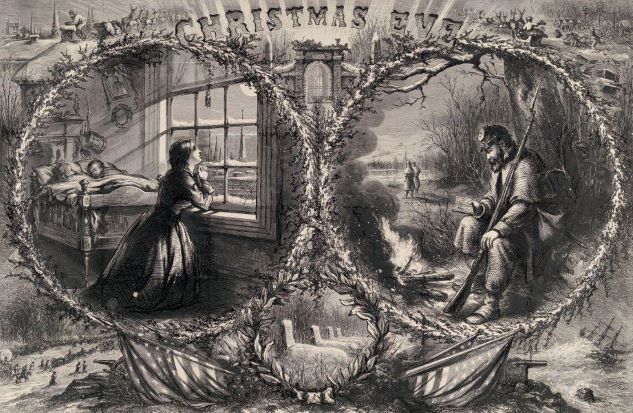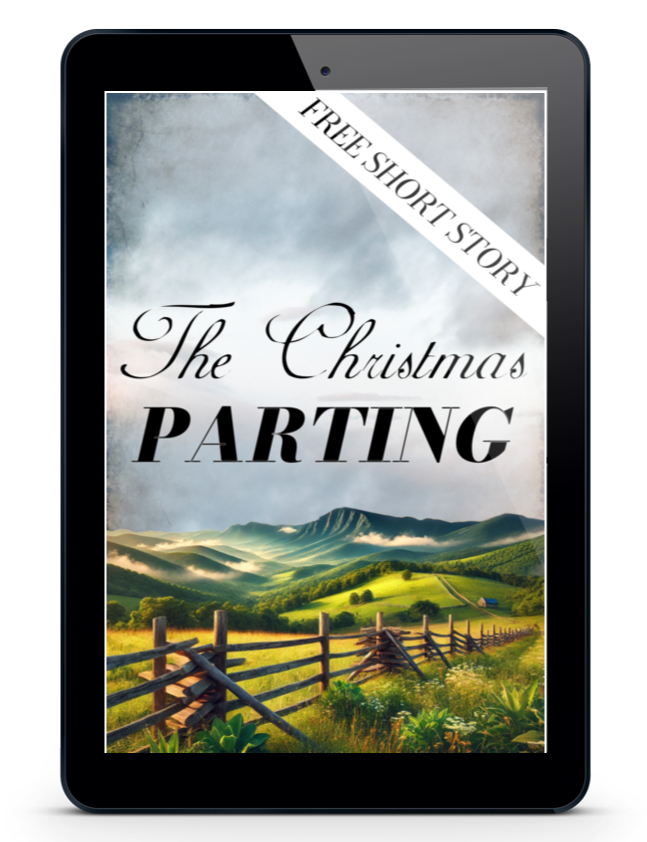Voices of the Past
Historical Romance Author

A Civil War Christmas
Wednesday, December 18, 2024 by Rev. John R. Paxton

Christmas Eve December 1863 Drawing by Thomas Nast
A Christmas Truce
John R. Paxton was an eighteen-year-old Pennsylvania college junior in May 1862 when his mathematics professor showed up on the last day of class dressed in a Yankee uniform. Professor Fraser, now known as Captain Fraser, used his final lecture to spur his students to volunteer for the Union.
Paxton answered the rallying cry along with 101 others from the college. They’d read of war in books. Now they’d live it in their bodies and hearts. It would become a part of them, its traces remaining until they drew their last breaths.
More than twenty years after the war, Paxton wrote about a bright spot amongst the cold, hunger, and hardships: an unofficial Christmas truce along the Rappahannock River in Virginia.
Christmas on the Rappahannock
By Rev. John R. Paxton, D.D. (He published his true account in Harper’s Weekly in 1886.)
… I started for Richmond in July, 1862, a lad eighteen years old, a junior in college, and chafing to be at it, – to double quick it after John Brown’s soul, which, since it did not require a knapsack or three days’ rations or a canteen or a halt during the night for sleep, was always marching on. On the night before Christmas, 1862, I was a dejected young patriot, wishing I hadn’t done it, shivering in the open weather a mile back of the Rappahannock, on the reserve picket and exposed to a wet snowstorm. There was not a stick of wood within five miles of us; all cut down, down, even the roots of trees, and burned up. We lay down on our rubber blankets, pulled our woolen blankets over us, spooned it as close as we could to get to steal warmth from our comrades and tried not to cry.
Next morning the snow lay heavy and deep, and the men, when I wakened and looked about me, reminded me of a church graveyard in winter. “Fall in for picket duty. There, come, Moore, McMeaus, Paxton, Perrine, Pollock, fall in.” We fell in, of course, No breakfast; chilled to the marrow; snow a foot deep. We tightened our belts on our empty stomachs, seized our rifles and marched to the river to take our six hours on duty.
It was Christmas Day, 1862. “And so this is war,” my old me said to himself while he paced in the snow his two hours on the river’s brink. “And I am out here to shoot that lean, lank, coughing, cadaverous-looking butternut fellow over the river. So this is war; this is being a soldier; this is the genuine article; this is H. Greely’s ‘On to Richmond.’ Well, I wish he were here in my place, running to keep warm, pounding his arms and breast to make the chilled blood circulate. So this is war, tramping up and down this river my fifty yards with wet feet, empty stomach, swollen nose.”
Alas, when lying under the trees in the college campus last June, war meant to me martial music, gorgeous brigadiers in blue and gold, tall young men in line, shining in brass. War meant ot me tumultuous memories of Bunker Hill, Caesar’s Tenth Legion, the Charge of the Six Hundred, – anything but this. Pshaw, I wish I were home. Let me see. Home? God’s country. A tear? Yes, it is a tear. What are they doing at home? This is Christmas Day. Home? Well, stockings on the wall, candy, turkey, fun, merry Christmas, and the face of the girl I left behind. Another tear? Yes, I couldn’t help it. I was only eighteen, and there was such a contrast between Christmas, 1862, on the Rappahannock and other Christmases. Yes, there was a girl, too, – such sweet eyes, such long lashes, such a low tender voice.
“Come, move quicker. Who goes there?” Shift the rifle from one aching shoulder to the other.
“Hello, Johnny, what are you up to?” The river was narrow, but deep and swift. It was a wet cold, not a freezing cold. There was no ice, too swift for that.
“Yank, with no overcoat, shoes full of holes, nothing to eat but parched corn and tabacco, and with this derned Yankee snow a foot deep, there’s nothin’ left, nothin’ but to get up a cough by way of protestin’ against this infernal ill treatment of the body. We uns, Yank, all have a cough over here, and there’s no sayin’ which will run us to hole first, the cough or your bullets.”
The snow still fell, the keen wind, raw and fierce, cut to the bone. It was God’s worst weather, in God’s forlornest, bleakest spot of ground, that Christmas Day of ’62 on the Rappahannock, a half-mile below the town of Fredericksburg. But come, pick up your prostrate pluck, you shivering private. Surely there is enough dampness around without your adding to it your tears.
“Let’s laugh, boys.”
“Hello, Johnny.”
“Hello, yourself, Yank.”
“Merry Christmas, Johnny.”
“Same to you, Yank.”
“Say, Johnny, got anything to trade?”
“Say, Johnny, got anything to trade?”
“Parched corn and tabacco, – the size of our Christmas, Yank.”
“All right; you shall have some of our coffee and sugar and pork. Boys, find the boats.”
Such boats! I see the children sailing them on small lakes in our Central park. Some Yankee, desperately hungry for tobacco, invented them for trading with the Johnnies. They were hid away under the backs of the river for successive relays of pickets.
We got out the boats. An old handkerchief answered for a sail. We loaded them with coffee, sugar, pork, and set the sail and watched them slowly creep to the other shore. And the Johnnies? To see them crowd the bank and push and scramble to be the first to seize the boats, going into the water and stretching out their long arms. Then, when they pulled the boats ashore, and stood in a group over the cargo, and to hear their exclamations, “Hurrah for hog.” “Say, that’s not roasted rye, but genuine coffee. Smell it, you’uns.” “And sugar, too!”
Then they divided the consignment. They laughed and shouted, “Reckon you’uns been good to we’uns this Christmas Day, Yanks.” Then they put parched corn, tobacco, ripe persimmons, into the boats and sent them back to us. And we chewed the parched corn, smoked real Virginia leaf, ate persimmons, which if they weren’t very filling at least contracted our stomachs to the size of our Christmas dinner. And so the day passed. We shouted, “Merry Christmas, Johnny.” They shouted, “Same to you, Yank.” And we forgot the biting wind, the chilling cold; we forgot those men over there were our enemies, whom it might be our duty to shoot before evening.
We had bridged the river, spanned the bloody chasm. We were brothers, not goes, waving salutations of good-will in the name of the Babe of Bethlehem, on Christmas Day in ’62. At the very front of the opposing armies, the Christ Child struck a truce of us, broke down the wall of partition, became our peace. We exchanged gifts. We shouted greetings back and forth. We kept Christmas and our hears were lighter of it, and our shivering bodes were not quite so cold.
–Christmas Number, Harper’s Weekly, 1886.
Join Sherry's
Writing Journey
Previous Posts
Second Chances: A Real-life Love Story from a Reader
Karen B. Martin
3/12/2025
When We Can't, God Can
S.R. Shindelar
1/17/2025
A Civil War Christmas
Rev. John R. Paxton
12/18/2024
Maybe you
Erma Ullrey
9/20/2024
Interview with Historic Romance Author Susan Mathis
Sherry Shindelar
8/16/2024
I Was Born on the Prairie
Sherry Shindelar
8/12/2024
Waiting….
Jamie Ogle
2/9/2024
Quanah Wins His Bride
Sherry Shindelar
1/12/2024
Transforming Christmas
Sherry Shindelar
12/15/2023
Moravians: Missionaries to the Cherokee
Sarah Hanks
11/9/2023
A New Twist on Benjamin Franklin
Susan Page Davis
10/11/2023
Meet a Historical Romance Editor
Denise Weimer
9/15/2023
Making a Stand at King’s Mountain
Sherry Shindelar
8/11/2023
Female Spy Saves the Day
Sherry Shindelar
7/14/2023
Preparation Commune
Cathy Richmond
6/14/2023
The Teen Who Sculptured Lincoln
Sherry Shindelar
5/5/2023
Recipes from the Past: With Giveaway and Favor
Donna Schlachter
4/21/2023
Emeline Pigott: Confederate Spy
Sherry Shindelar
3/24/2023
First Great Awakening
Lynne Tagawa
3/10/2023
Stories that Haunt
Sherry Shindelar
2/24/2023
Valentine's Day 1983
Sherry Shindelar
2/10/2023
The Battle for Miss Nellie’s Heart
Sherry Shindelar
1/27/2023
Ukrainian Love Story
Sherry Shindelar
1/13/2023
Hannah
Sherry Shindelar
12/30/2022
The Bible Controversy of King James
Tamera Kraft
12/26/2022
Spymaster Extraordinaire
Sherry Shindelar
12/2/2022
Unshakeable
Sherry Shindelar
11/28/2022
God’s Tapestry: One Thread at a Time
Sherry Shindelar
11/4/2022
Ruth: Where Thou Goest, I Will Go (Part 1)
Sherry Shindelar
10/21/2022
Courtship in the Midst of War
Sherry Shindelar
9/30/2022
Identity Theft 597 BC
Sherry Shindelar
9/16/2022
Celebrating with Jamie Ogle
Sherry Shindelar
8/18/2022
Two Husbands for Pocahontas
Sherry Shindelar
8/5/2022
The Power of Stories
Sherry Shindelar
7/22/2022
Indian Princess and the Soldier: Love Story or Myth
Sherry Shindelar
7/15/2022
Tobacco Brides: Slavery, Indentureship, or Empowerment
Sherry Shindelar
7/1/2022
Jamestown: New Hope or Death Trap?
Sherry Shindelar
6/24/2022
Conquering Black Elk Peak and Staying Out of the Basement
Sherry Shindelar
6/3/2022
Encouraging Women and Shaping Culture with her Pen
Sherry Shindelar
5/20/2022
Operation Pied Piper
Linda Shenton Matchett
4/29/2022
A Crazy Summer of Romance
Kathy McKinsey
4/22/2022
When Prayers Aren’t Answered the Way You Expected
Sherry Shindelar
4/18/2022
Paper Bag Queen: A Female Edison
eMarie
4/1/2022
James Taylor: Capturing the World with a Pencil
Sherry Shindelar
3/18/2022
Undercover Girl Scout
Marie Sontag
3/3/2022
Forbidden Romance: From First Impression to Elopement
Sherry Shindelar
2/18/2022
What Can We Do with these Women
Sherry Shindelar
2/4/2022
Award-winning Historical Fiction Author Lori Benton Shares her Heart
Sherry Shindelar
1/21/2022
Bankrupt and Broke but Not Defeated
Sherry Shindelar
1/14/2022
From Shunned and Rowdy to Christmas as We Know It
Sherry Shindelar
12/17/2021
Where Thou Goest, I Will Go
Sherry Shindelar
12/3/2021
Edwardian Era: Most Photographed Woman
Jessica Sly
11/19/2021

